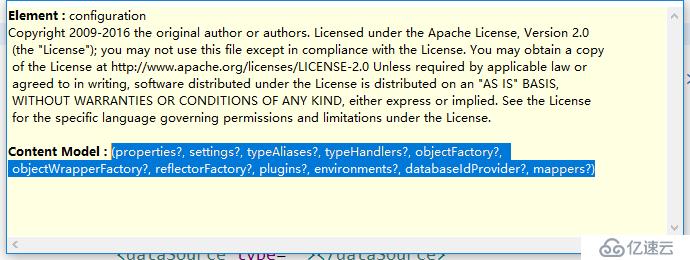您好,登录后才能下订单哦!
密码登录
登录注册
点击 登录注册 即表示同意《亿速云用户服务条款》
resultMap即自定义结果集映射规则,之前我们使用的resultType是MyBatis为我们提供的默认映射规则,使用方法如下:
<mapper namespace="com.zgz.MyBatis.dao.DeptMapper">
<select id="getDeptById" resultType="com.zgz.MyBatis.bean.Dept">
select id, dept_name deptName from tbl_dept where id = #{id}
</select>
</mapper>那么resultMap的作用是什么呢?之前我们在处理数据库中字段与javabean中的属性不一致的问题时,采用的方法是起别名或者开启mybatis的自动驼峰映射,现在可以使用resultMap来做,另外可以使用解决级联查询的问题
我们现在新建一张员工部门表,要求是在我们查询员工的同时查询出员工对应的部门?
首先给出对应的JavaBean:
public class Dept {
private Integer id;
private String deptName;
//get,set,tostring()。。。
}写上相应的mapper:
<mapper namespace="com.zgz.MyBatis.dao.DeptMapper">
<select id="getDeptById" resultType="com.zgz.MyBatis.bean.Dept">
select id, dept_name deptName from tbl_dept where id = #{id}
</select>
</mapper>在SQL映射文件中进行配置:
<?xml version="1.0" encoding="UTF-8" ?>
<!DOCTYPE mapper
PUBLIC "-//mybatis.org//DTD Mapper 3.0//EN"
"http://mybatis.org/dtd/mybatis-3-mapper.dtd">
<mapper namespace="com.zgz.MyBatis.dao.EmployeeMapperPlus">
<!--
测试resultMap(自定义某个javabean的封装规则)
type:自定义规则的java类型
id:方便引用,唯一
-->
<resultMap type="com.zgz.MyBatis.bean.Employee" id="MyEmp">
<!--
id:指定主键的封装规则,底层会有优化
column:指定哪一列
property:指定对应的javabean属性
-->
<id column="id" property="id"/>
<!-- result是指定普通列的封装规则 -->
<result column="last_name" property="lastName"/>
<!-- 其他的不指定会默认封装,最好指定一下 -->
<result column="email" property="email"/>
<result column="gender" property="gender"/>
</resultMap>
<!-- resultMap:自定义结果集映射规则 -->
<select id="getEmployeeByGender" resultMap="MyEmp">
select * from tbl_employee where gender = #{gender}
</select>
<!-- resultMap级联查询 -->
<!-- 第一种方法:使用级联属性封装结果集-->
<resultMap type="com.zgz.MyBatis.bean.Employee" id="MySecond">
<id column="id" property="id"/>
<result column="last_name" property="lastName"/>
<result column="gender" property="gender"/>
<result column="email" property="email"/>
<result column="did" property="dept.id"/>
<result column="dept_name" property="dept.deptName"/>
</resultMap>
<!-- 第二种方法: 使用association定义单个对象的封装 -->
<resultMap type="com.zgz.MyBatis.bean.Employee" id="MyThird">
<id column="id" property="id"/>
<result column="last_name" property="lastName"/>
<result column="gender" property="gender"/>
<result column="email" property="email"/>
<!--
association:可以指定联合的javabean对象
property:指定哪个属性是联合的对象
javaType:指定这个属性的类型(不能省略)
-->
<association property="dept" javaType="com.zgz.MyBatis.bean.Dept">
<id column="did" property="id"/>
<result column="dept_name" property="deptName"/>
</association>
</resultMap>
<!-- 第三种方法:分步查询 -->
<resultMap type="com.zgz.MyBatis.bean.Employee" id="MyFourth">
<id column="id" property="id"/>
<result column="last_name" property="lastName"/>
<result column="gender" property="gender"/>
<result column="email" property="email"/>
<!--
使用 association 进行分步查询:
1. 先按照员工id查询员工信息
2. 根据查询到的员工信息的d_id值去查出部门信息
3. 部门设置到员工里面
association 定义关联对象的封装规则
select:表明当前属性是调用select指定的方法查出的结果
column:指定将哪一列的值传给这个方法
流程:(理解)
使用select制定的方法,传入column指定的这列参数的值查出对象,并封装给property指定的属性
-->
<association property="dept"
select="com.zgz.MyBatis.dao.DeptMapper.getDeptById" column="d_id">
</association>
</resultMap>
<!-- 场景一:查询员工的同时查询出员工对应的部门 -->
<select id="getEmpAndDept" resultMap="MyThird">
SELECT e.id id, e.last_name last_name,e.email email, e.gender gender, e.d_id d_id, d.id did, d.dept_name dept_name
FROM tbl_employee e, tbl_dept d
WHERE e.d_id = d.id AND e.id = #{id}
</select>
<!-- 分步查询 -->
<select id="getEmpByIdStep" resultMap="MyFourth">
select * from tbl_employee where id = #{id}
</select>
<!--
分步查询可以使用延迟加载(按需加载)(懒加载):
Employee ===》 Dept
要查询Dept,我们每次查询Employee时都将一起查询出来
为了达到部门信息在我们使用的时候在查询出来的要求,我们可以在分步查询的基础上加两个配置(在mybatis中的主配置文件中)
-->
</mapper>在主配置文件中配置:
<configuration>
<!-- configuration里的标签必须按顺序写 -->
<settings>
<!-- 显示我们需要更改配置的值,即使是默认的建议写上,防止版本更新带来的问题 -->
<setting name="lazyLoadingEnabled" value="true"/>
<setting name="aggressiveLazyLoading" value="false"/>
</settings>
<environments default="development">
<environment id="test">
<transactionManager type=""></transactionManager>
<dataSource type=""></dataSource>
</environment>
<environment id="development">
<transactionManager type="JDBC" />
<dataSource type="POOLED">
<property name="driver" value="com.mysql.jdbc.Driver" />
<property name="url"
value="jdbc:mysql://localhost:3306/mybatis?useSSL=false" />
<property name="username" value="root" />
<property name="password" value="123456" />
</dataSource>
</environment>
</environments>
<!-- 将我们写好的sql映射文件(testEmployeeMapper.xml)注册到全局配置文件(mybatis-config.xml)中 -->
<mappers>
<mapper resource="testEmployeeMapperPlus.xml" />
<mapper resource="testDeptMapper.xml" />
</mappers>
</configuration>1》千万不要忘记将我们写好的sql映射文件注册到全局配置文件中,注意是所有的sql映射文件
<mappers>
<mapper resource="testEmployeeMapperPlus.xml" />
<mapper resource="testDeptMapper.xml" />
</mappers> 2》configuration里的标签必须按顺序写,标签是有顺序的
免责声明:本站发布的内容(图片、视频和文字)以原创、转载和分享为主,文章观点不代表本网站立场,如果涉及侵权请联系站长邮箱:is@yisu.com进行举报,并提供相关证据,一经查实,将立刻删除涉嫌侵权内容。